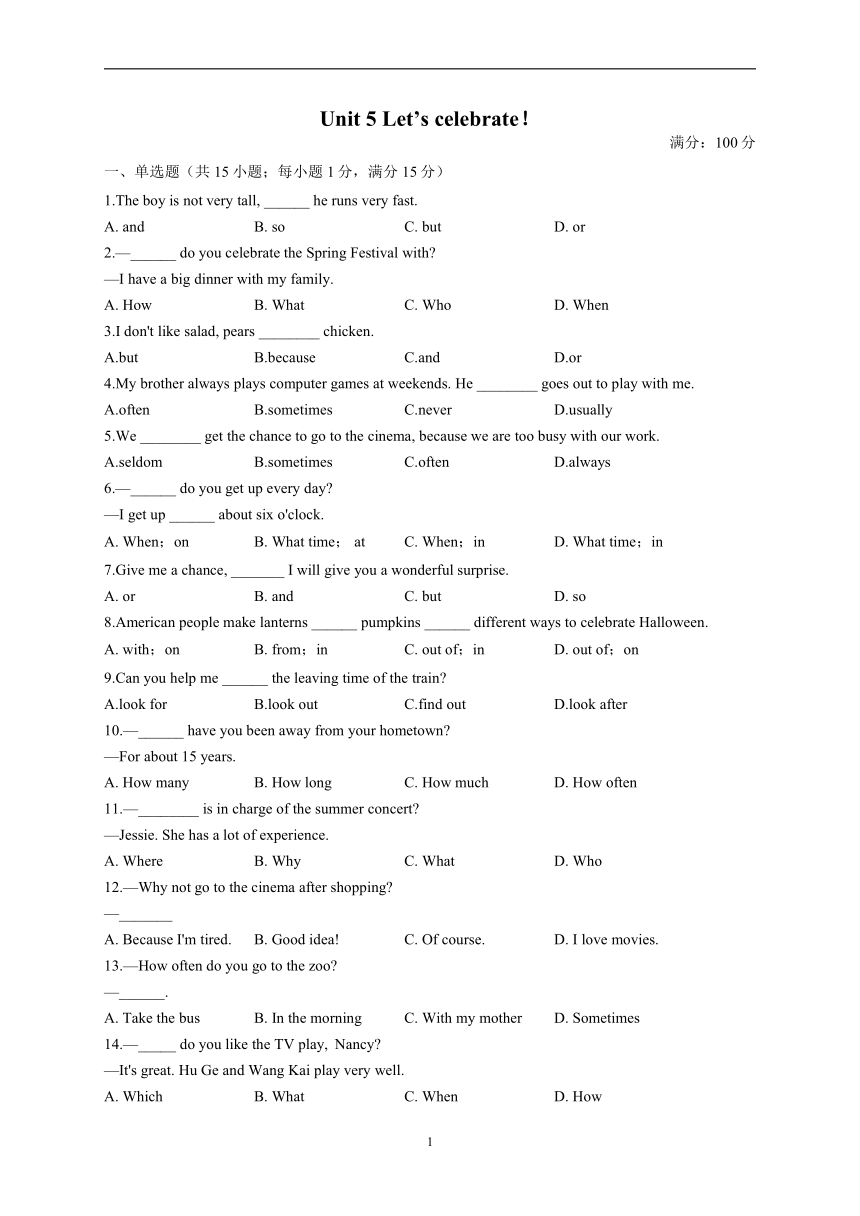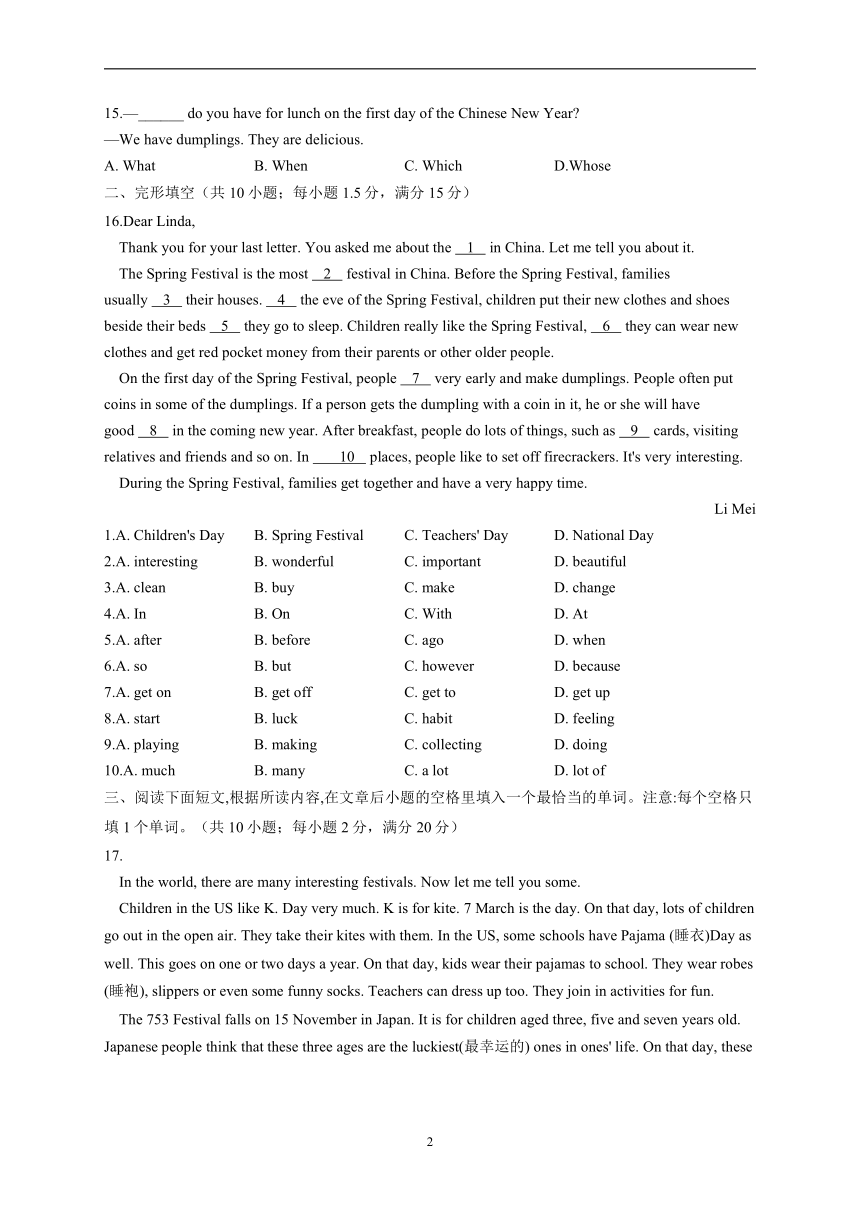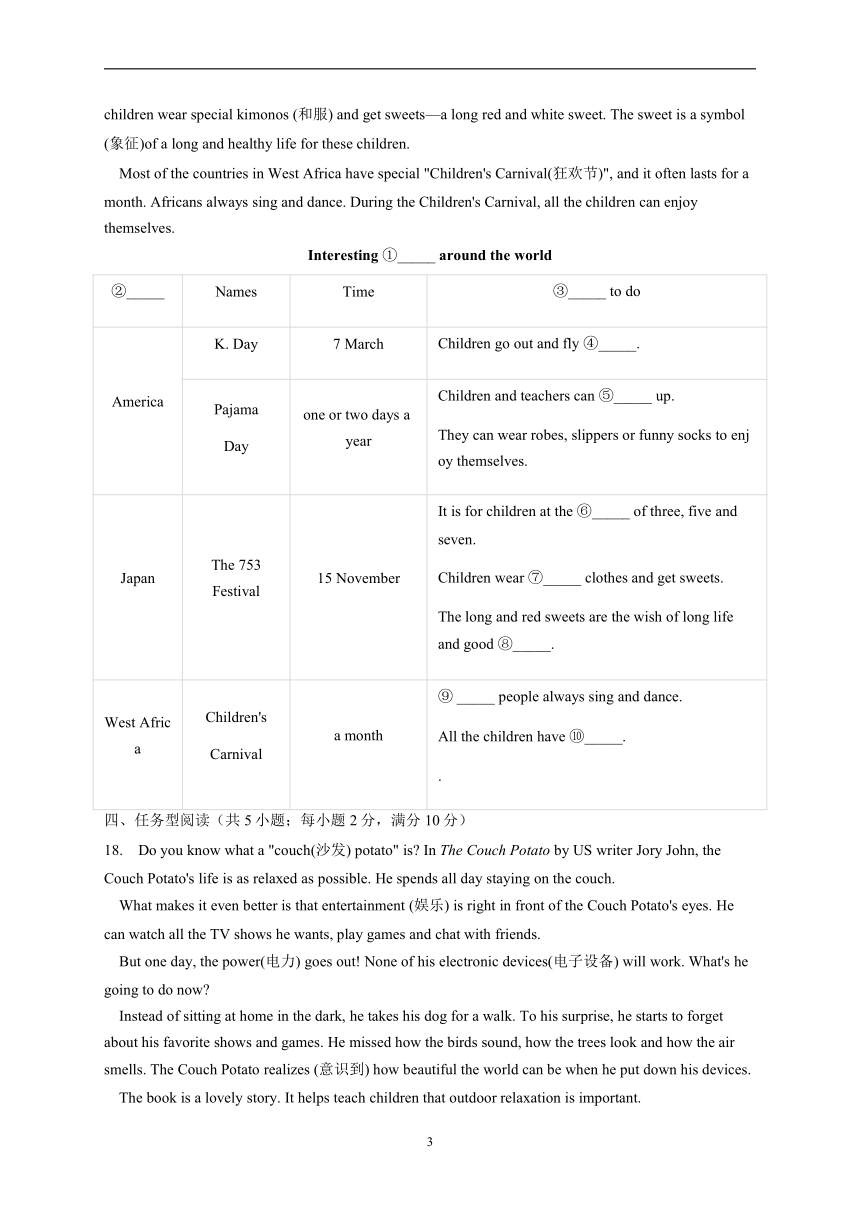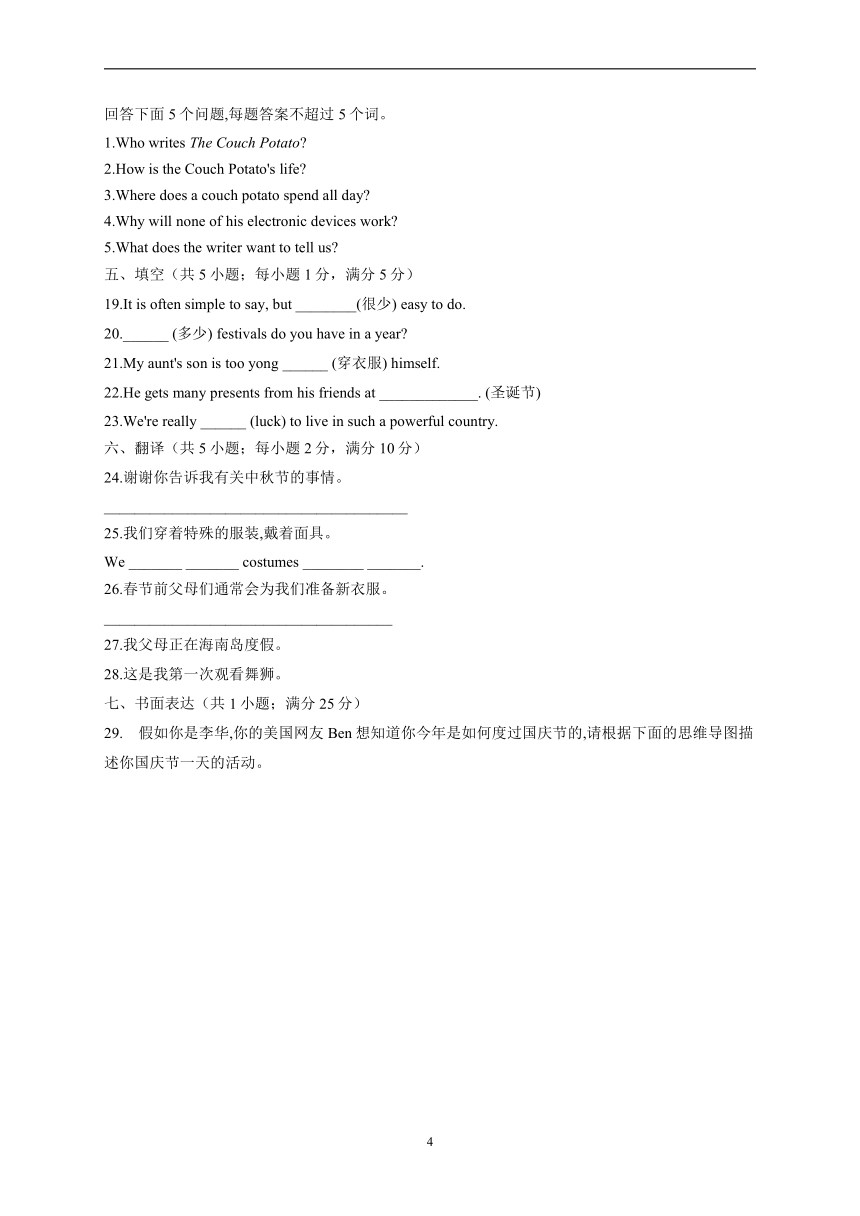Unit 5 Let’s celebrate!2022-2023学年牛津译林版英语七年级上册单元同步练习(word版,含解析)
文档属性
| 名称 | Unit 5 Let’s celebrate!2022-2023学年牛津译林版英语七年级上册单元同步练习(word版,含解析) |  | |
| 格式 | docx | ||
| 文件大小 | 144.9KB | ||
| 资源类型 | 教案 | ||
| 版本资源 | 牛津译林版 | ||
| 科目 | 英语 | ||
| 更新时间 | 2022-08-15 10:26:50 | ||
图片预览




文档简介
Unit 5 Let’s celebrate!
满分:100分
一、单选题(共15小题;每小题1分,满分15分)
1.The boy is not very tall, ______ he runs very fast.
A. and B. so C. but D. or
2.—______ do you celebrate the Spring Festival with
—I have a big dinner with my family.
A. How B. What C. Who D. When
3.I don't like salad, pears ________ chicken.
A.but B.because C.and D.or
4.My brother always plays computer games at weekends. He ________ goes out to play with me.
A.often B.sometimes C.never D.usually
5.We ________ get the chance to go to the cinema, because we are too busy with our work.
A.seldom B.sometimes C.often D.always
6.—______ do you get up every day
—I get up ______ about six o'clock.
A. When;on B. What time; at C. When;in D. What time;in
7.Give me a chance, _______ I will give you a wonderful surprise.
A. or B. and C. but D. so
8.American people make lanterns ______ pumpkins ______ different ways to celebrate Halloween.
A. with;on B. from;in C. out of;in D. out of;on
9.Can you help me ______ the leaving time of the train
A.look for B.look out C.find out D.look after
10.—______ have you been away from your hometown
—For about 15 years.
A. How many B. How long C. How much D. How often
11.—________ is in charge of the summer concert
—Jessie. She has a lot of experience.
A. Where B. Why C. What D. Who
12.—Why not go to the cinema after shopping
—_______
A. Because I'm tired. B. Good idea! C. Of course. D. I love movies.
13.—How often do you go to the zoo
—______.
A. Take the bus B. In the morning C. With my mother D. Sometimes
14.—_____ do you like the TV play, Nancy
—It's great. Hu Ge and Wang Kai play very well.
A. Which B. What C. When D. How
15.—______ do you have for lunch on the first day of the Chinese New Year
—We have dumplings. They are delicious.
A. What B. When C. Which D.Whose
二、完形填空(共10小题;每小题1.5分,满分15分)
16.Dear Linda,
Thank you for your last letter. You asked me about the 1 in China. Let me tell you about it.
The Spring Festival is the most 2 festival in China. Before the Spring Festival, families usually 3 their houses. 4 the eve of the Spring Festival, children put their new clothes and shoes beside their beds 5 they go to sleep. Children really like the Spring Festival, 6 they can wear new clothes and get red pocket money from their parents or other older people.
On the first day of the Spring Festival, people 7 very early and make dumplings. People often put coins in some of the dumplings. If a person gets the dumpling with a coin in it, he or she will have good 8 in the coming new year. After breakfast, people do lots of things, such as 9 cards, visiting relatives and friends and so on. In 10 places, people like to set off firecrackers. It's very interesting.
During the Spring Festival, families get together and have a very happy time.
Li Mei
1.A. Children's Day B. Spring Festival C. Teachers' Day D. National Day
2.A. interesting B. wonderful C. important D. beautiful
3.A. clean B. buy C. make D. change
4.A. In B. On C. With D. At
5.A. after B. before C. ago D. when
6.A. so B. but C. however D. because
7.A. get on B. get off C. get to D. get up
8.A. start B. luck C. habit D. feeling
9.A. playing B. making C. collecting D. doing
10.A. much B. many C. a lot D. lot of
三、阅读下面短文,根据所读内容,在文章后小题的空格里填入一个最恰当的单词。注意:每个空格只填1个单词。(共10小题;每小题2分,满分20分)
17.
In the world, there are many interesting festivals. Now let me tell you some.
Children in the US like K. Day very much. K is for kite. 7 March is the day. On that day, lots of children go out in the open air. They take their kites with them. In the US, some schools have Pajama (睡衣)Day as well. This goes on one or two days a year. On that day, kids wear their pajamas to school. They wear robes (睡袍), slippers or even some funny socks. Teachers can dress up too. They join in activities for fun.
The 753 Festival falls on 15 November in Japan. It is for children aged three, five and seven years old. Japanese people think that these three ages are the luckiest(最幸运的) ones in ones' life. On that day, these children wear special kimonos (和服) and get sweets—a long red and white sweet. The sweet is a symbol (象征)of a long and healthy life for these children.
Most of the countries in West Africa have special "Children's Carnival(狂欢节)", and it often lasts for a month. Africans always sing and dance. During the Children's Carnival, all the children can enjoy themselves.
Interesting ①_____ around the world
②_____ Names Time ③_____ to do
America K. Day 7 March Children go out and fly ④_____.
Pajama Day one or two days a year Children and teachers can ⑤_____ up. They can wear robes, slippers or funny socks to enjoy themselves.
Japan The 753 Festival 15 November It is for children at the ⑥_____ of three, five and seven. Children wear ⑦_____ clothes and get sweets. The long and red sweets are the wish of long life and good ⑧_____.
West Africa Children's Carnival a month ⑨ _____ people always sing and dance. All the children have ⑩_____. .
四、任务型阅读(共5小题;每小题2分,满分10分)
18. Do you know what a "couch(沙发) potato" is In The Couch Potato by US writer Jory John, the Couch Potato's life is as relaxed as possible. He spends all day staying on the couch.
What makes it even better is that entertainment (娱乐) is right in front of the Couch Potato's eyes. He can watch all the TV shows he wants, play games and chat with friends.
But one day, the power(电力) goes out! None of his electronic devices(电子设备) will work. What's he going to do now
Instead of sitting at home in the dark, he takes his dog for a walk. To his surprise, he starts to forget about his favorite shows and games. He missed how the birds sound, how the trees look and how the air smells. The Couch Potato realizes (意识到) how beautiful the world can be when he put down his devices.
The book is a lovely story. It helps teach children that outdoor relaxation is important.
回答下面5个问题,每题答案不超过5个词。
1.Who writes The Couch Potato
2.How is the Couch Potato's life
3.Where does a couch potato spend all day
4.Why will none of his electronic devices work
5.What does the writer want to tell us
五、填空(共5小题;每小题1分,满分5分)
19.It is often simple to say, but ________(很少) easy to do.
20.______ (多少) festivals do you have in a year
21.My aunt's son is too yong ______ (穿衣服) himself.
22.He gets many presents from his friends at _____________. (圣诞节)
23.We're really ______ (luck) to live in such a powerful country.
六、翻译(共5小题;每小题2分,满分10分)
24.谢谢你告诉我有关中秋节的事情。
________________________________________
25.我们穿着特殊的服装,戴着面具。
We _______ _______ costumes ________ _______.
26.春节前父母们通常会为我们准备新衣服。
______________________________________
27.我父母正在海南岛度假。
28.这是我第一次观看舞狮。
七、书面表达(共1小题;满分25分)
29. 假如你是李华,你的美国网友Ben想知道你今年是如何度过国庆节的,请根据下面的思维导图描述你国庆节一天的活动。
注意:1.参考词汇:阅兵仪式(parade),海报(poster),画展(art exhibition),博物馆(museum),珠江(Pearl River),烟花(firework display);
2.单词数:不少于60个(文章的开头已给出,不计入字数)
3.不得透露学校,姓名等任何个人信息,否则不予评分。
I had a good time on Nation Day.
____________________________________________________________________________________________________________________________________________________________________________________________________________________________________________________________________________________________________________________________________
答案以及解析
1.答案:C
解析:考查连词辨析。句意:这个男孩个子不高,但他跑得很快。and和;so所以;but但是;or或者。前后句之间是转折关系,应用but连接。故选C。
2.答案:C
解析:考查疑问词。根据下句的回答"我和家人在一起吃了一顿大餐",可知上句问的是"你是和谁一起庆祝春节的"。因此选C。
3.答案:D
解析:句意:我不喜欢沙拉、梨和鸡肉。考查连词辨析。but但是(表转折);because因为;and和(表并列时,用于肯定句中);or和(表并列时,用在否定句中)。根据“I don’t like salad, pears...chicken.”可知,是沙拉、梨和鸡肉都不喜欢,因为句子是否定句,所以填or。故选D。
4.答案:C
解析:句意:我的弟弟周末总是玩电脑游戏。他从不跟我出去玩。考查副词辨析。often经常;sometimes有时;never从不;usually经常。根据"My brother always plays computer games at weekends."可知弟弟周末总是玩游戏,因此从不跟我出去玩。故选C。
5.答案:A
解析:句意:我们很少有机会去电影院,因为我们的工作太忙了。考查频率副词。seldom很少;sometimes有时;often经常;always 总是,根据后面的"because we are too busy with our work"可知,应该是很少去电影院,故选A。
6.答案:B
解析:考查疑问词和介词。因为下句中说的是六点钟, 所以前面的疑问词是what time。又因为在几点钟用 介词at来表示。
7.答案:B
解析:考查并列连词辨析。句意:给我一个机会,我会还您一个惊喜。本处and表达顺连。结合语境,故选B。
8.答案:C
解析:考查介词。前面指的是"用南瓜做灯笼",所以用make... out of。后面指的是"用不同的方式",后面用in different ways(用不同的方式)。
9.答案:C
解析:考查短语辨析。A.寻找;B.小心;C.找到;D.照顾。根据句意"你能帮助我找到火车离开的时间吗"可知选择C。
10.答案:B
解析:考查疑问词的用法。句意:—你离开家乡多久了 —大约15年了。 how many多少,用来对复数可数名词的数量进行提问。 how long多久,用来对一段时间进行提问,答语通常是"for+一段时间"; how much多少,用来对不可数名词的量进行提问或对物品的价格进行提问;how often多久一次,用来对频度进行提问。由答语可知,问句是对"一段时间"进行提问,应用 how long。故选B。
11.答案:D
解析:考查特殊疑问词辨析。根据答语" Jessie. She has a lot of experience"可知,本处提问的是"谁(who)负责那场夏季音乐会的"。故选D。
12.答案:B
解析:考查交际用语。根据上句"为什么不在购物后去看电影",可知下句应该回答是"好主意"。
13.答案:D
解析:考查疑问词的回答。根据上句的"how often",可知下句中只有选项D(有时)表示的是频率。因此选D。
14.答案:D
解析:考查疑问词。根据下句的回答"很棒",可知上句问的是"南希,这个电视剧怎么样?"因此用句型 how do you like...(你觉得……怎么样)。
15.答案:A
解析:考查疑问词。根据"我们吃饺子",可知上句问的是"你们午餐吃什么"。
16.答案:1-5 BCABB 6-10 DDBAB
解析:1.根据下文" The spring Festival is the most..."可知,说的是关于春节的事。
2.句意:春节是中国最重要的节日。
3.句意:在春节来临前,人们通常打扫屋子。
4.这里指的是在除夕这一天,所以用介词on。
5.句意:在睡觉前孩子们准备好新衣新鞋,并放在床边。
6.此处介绍了孩子们喜欢春节的原因。
7.句意:春节第一天人们起床很早,然后开始包饺子。
8.句意:如果人们吃到了带硬币的饺子,那么他们新年里会交好运。
9.这里是列举了打牌、拜访亲戚朋友等等活动。
10.因为后面 places是可数名词复数,因此用many来修饰。
17.答案:①festivals ②Countries ③What ④kites ⑤dress ⑥age ⑦special ⑧health ⑨African ⑩fun
解析:①根据" In the world, there are many interesting festivals"可知答案。
②这一列给出的是国家名称。
③这一列给出的是所做的事。
④根据句子"On that day, lots of children go out in the open air. They take their kites with them"可知答案。
⑤根据句子"... kids wear their pajamas to school"和"Teachers can dress up too"可知答案。
⑥at the age of固定搭配,指"在……岁"。
⑦根据句子"On that day, these children wear special kimonos(和服)"可知答案。
⑧根据句子" The sweet is a symbol(象征) of a long and healthy life for these children"可知答案。
⑨根据句子"Africans always sing and dance"可知答案。
⑩根据句子"…all the children can enjoy themselves"可知答案。 enjoy oneself= have fun.
18.答案:1. Jory John.
2. As relaxed as possible.
3. On the couch.
4. Because the power goes out.
5. Outdoor relaxation is important.
19.答案:seldom
解析:句意:说起来容易做起来难。根据"often"可知,空处用频度副词,seldom几乎不,很少。故填seldom。
20.答案:How many
21.答案:to dress
22.答案:Christmas
解析:句意:在圣诞节的时候,他从朋友那里得到了很多礼物。Christmas圣诞节,是一个节日的名称,第一个字母需要大写。
23.答案:lucky
解析:考查形容词。be动词的后面跟形容词作表语,luck的形容词是 lucky。
24.答案:Thank you for telling me something about Mid-Autumn Festival.
解析:thank you for doing谢谢……;tell sb sth告诉某人某事;about关于,故填Thank you for telling me something about Mid-Autumn Festival.
25.答案:wear; special; and; masks
解析:句意:我们穿着特殊的服装,戴着面具。表示穿的意思英语有put on,wear和dress。put on:穿,戴,强调穿这个瞬间动作,不可和时间段一块使用;wear:穿着,戴着,强调穿的状态,可与时间段一块使用;dress:给……穿衣服。根据句意(穿着和戴着)可知穿的状态,故用wear。mask面具,可数名词,可数名词不可单独使用,要用复数形式,表示泛指。结合句意和提示可知答案是1.wear 2.special 3.and 4.masks 。
26.答案:Usually our parents get new clothes ready for us before the Spring Festival.
27.答案:My parents are on holiday in Hainan Island.
28.答案:It's my first time to watch the lion dance.
29.答案:
I had a good time on National Day. In the morning, I watched the parade on TV with my family at home. Then I made a poster about it. In the afternoon, I went to the art exhibition in Guangdong Museum. From the pictures, I learnt about the history of New China and the great changes in people’s life during the past years. Later in the evening, there was a firework display along the Pearl River. We really enjoyed the show and took many amazing photos.
It was great fun and I felt so proud of our country.
2
满分:100分
一、单选题(共15小题;每小题1分,满分15分)
1.The boy is not very tall, ______ he runs very fast.
A. and B. so C. but D. or
2.—______ do you celebrate the Spring Festival with
—I have a big dinner with my family.
A. How B. What C. Who D. When
3.I don't like salad, pears ________ chicken.
A.but B.because C.and D.or
4.My brother always plays computer games at weekends. He ________ goes out to play with me.
A.often B.sometimes C.never D.usually
5.We ________ get the chance to go to the cinema, because we are too busy with our work.
A.seldom B.sometimes C.often D.always
6.—______ do you get up every day
—I get up ______ about six o'clock.
A. When;on B. What time; at C. When;in D. What time;in
7.Give me a chance, _______ I will give you a wonderful surprise.
A. or B. and C. but D. so
8.American people make lanterns ______ pumpkins ______ different ways to celebrate Halloween.
A. with;on B. from;in C. out of;in D. out of;on
9.Can you help me ______ the leaving time of the train
A.look for B.look out C.find out D.look after
10.—______ have you been away from your hometown
—For about 15 years.
A. How many B. How long C. How much D. How often
11.—________ is in charge of the summer concert
—Jessie. She has a lot of experience.
A. Where B. Why C. What D. Who
12.—Why not go to the cinema after shopping
—_______
A. Because I'm tired. B. Good idea! C. Of course. D. I love movies.
13.—How often do you go to the zoo
—______.
A. Take the bus B. In the morning C. With my mother D. Sometimes
14.—_____ do you like the TV play, Nancy
—It's great. Hu Ge and Wang Kai play very well.
A. Which B. What C. When D. How
15.—______ do you have for lunch on the first day of the Chinese New Year
—We have dumplings. They are delicious.
A. What B. When C. Which D.Whose
二、完形填空(共10小题;每小题1.5分,满分15分)
16.Dear Linda,
Thank you for your last letter. You asked me about the 1 in China. Let me tell you about it.
The Spring Festival is the most 2 festival in China. Before the Spring Festival, families usually 3 their houses. 4 the eve of the Spring Festival, children put their new clothes and shoes beside their beds 5 they go to sleep. Children really like the Spring Festival, 6 they can wear new clothes and get red pocket money from their parents or other older people.
On the first day of the Spring Festival, people 7 very early and make dumplings. People often put coins in some of the dumplings. If a person gets the dumpling with a coin in it, he or she will have good 8 in the coming new year. After breakfast, people do lots of things, such as 9 cards, visiting relatives and friends and so on. In 10 places, people like to set off firecrackers. It's very interesting.
During the Spring Festival, families get together and have a very happy time.
Li Mei
1.A. Children's Day B. Spring Festival C. Teachers' Day D. National Day
2.A. interesting B. wonderful C. important D. beautiful
3.A. clean B. buy C. make D. change
4.A. In B. On C. With D. At
5.A. after B. before C. ago D. when
6.A. so B. but C. however D. because
7.A. get on B. get off C. get to D. get up
8.A. start B. luck C. habit D. feeling
9.A. playing B. making C. collecting D. doing
10.A. much B. many C. a lot D. lot of
三、阅读下面短文,根据所读内容,在文章后小题的空格里填入一个最恰当的单词。注意:每个空格只填1个单词。(共10小题;每小题2分,满分20分)
17.
In the world, there are many interesting festivals. Now let me tell you some.
Children in the US like K. Day very much. K is for kite. 7 March is the day. On that day, lots of children go out in the open air. They take their kites with them. In the US, some schools have Pajama (睡衣)Day as well. This goes on one or two days a year. On that day, kids wear their pajamas to school. They wear robes (睡袍), slippers or even some funny socks. Teachers can dress up too. They join in activities for fun.
The 753 Festival falls on 15 November in Japan. It is for children aged three, five and seven years old. Japanese people think that these three ages are the luckiest(最幸运的) ones in ones' life. On that day, these children wear special kimonos (和服) and get sweets—a long red and white sweet. The sweet is a symbol (象征)of a long and healthy life for these children.
Most of the countries in West Africa have special "Children's Carnival(狂欢节)", and it often lasts for a month. Africans always sing and dance. During the Children's Carnival, all the children can enjoy themselves.
Interesting ①_____ around the world
②_____ Names Time ③_____ to do
America K. Day 7 March Children go out and fly ④_____.
Pajama Day one or two days a year Children and teachers can ⑤_____ up. They can wear robes, slippers or funny socks to enjoy themselves.
Japan The 753 Festival 15 November It is for children at the ⑥_____ of three, five and seven. Children wear ⑦_____ clothes and get sweets. The long and red sweets are the wish of long life and good ⑧_____.
West Africa Children's Carnival a month ⑨ _____ people always sing and dance. All the children have ⑩_____. .
四、任务型阅读(共5小题;每小题2分,满分10分)
18. Do you know what a "couch(沙发) potato" is In The Couch Potato by US writer Jory John, the Couch Potato's life is as relaxed as possible. He spends all day staying on the couch.
What makes it even better is that entertainment (娱乐) is right in front of the Couch Potato's eyes. He can watch all the TV shows he wants, play games and chat with friends.
But one day, the power(电力) goes out! None of his electronic devices(电子设备) will work. What's he going to do now
Instead of sitting at home in the dark, he takes his dog for a walk. To his surprise, he starts to forget about his favorite shows and games. He missed how the birds sound, how the trees look and how the air smells. The Couch Potato realizes (意识到) how beautiful the world can be when he put down his devices.
The book is a lovely story. It helps teach children that outdoor relaxation is important.
回答下面5个问题,每题答案不超过5个词。
1.Who writes The Couch Potato
2.How is the Couch Potato's life
3.Where does a couch potato spend all day
4.Why will none of his electronic devices work
5.What does the writer want to tell us
五、填空(共5小题;每小题1分,满分5分)
19.It is often simple to say, but ________(很少) easy to do.
20.______ (多少) festivals do you have in a year
21.My aunt's son is too yong ______ (穿衣服) himself.
22.He gets many presents from his friends at _____________. (圣诞节)
23.We're really ______ (luck) to live in such a powerful country.
六、翻译(共5小题;每小题2分,满分10分)
24.谢谢你告诉我有关中秋节的事情。
________________________________________
25.我们穿着特殊的服装,戴着面具。
We _______ _______ costumes ________ _______.
26.春节前父母们通常会为我们准备新衣服。
______________________________________
27.我父母正在海南岛度假。
28.这是我第一次观看舞狮。
七、书面表达(共1小题;满分25分)
29. 假如你是李华,你的美国网友Ben想知道你今年是如何度过国庆节的,请根据下面的思维导图描述你国庆节一天的活动。
注意:1.参考词汇:阅兵仪式(parade),海报(poster),画展(art exhibition),博物馆(museum),珠江(Pearl River),烟花(firework display);
2.单词数:不少于60个(文章的开头已给出,不计入字数)
3.不得透露学校,姓名等任何个人信息,否则不予评分。
I had a good time on Nation Day.
____________________________________________________________________________________________________________________________________________________________________________________________________________________________________________________________________________________________________________________________________
答案以及解析
1.答案:C
解析:考查连词辨析。句意:这个男孩个子不高,但他跑得很快。and和;so所以;but但是;or或者。前后句之间是转折关系,应用but连接。故选C。
2.答案:C
解析:考查疑问词。根据下句的回答"我和家人在一起吃了一顿大餐",可知上句问的是"你是和谁一起庆祝春节的"。因此选C。
3.答案:D
解析:句意:我不喜欢沙拉、梨和鸡肉。考查连词辨析。but但是(表转折);because因为;and和(表并列时,用于肯定句中);or和(表并列时,用在否定句中)。根据“I don’t like salad, pears...chicken.”可知,是沙拉、梨和鸡肉都不喜欢,因为句子是否定句,所以填or。故选D。
4.答案:C
解析:句意:我的弟弟周末总是玩电脑游戏。他从不跟我出去玩。考查副词辨析。often经常;sometimes有时;never从不;usually经常。根据"My brother always plays computer games at weekends."可知弟弟周末总是玩游戏,因此从不跟我出去玩。故选C。
5.答案:A
解析:句意:我们很少有机会去电影院,因为我们的工作太忙了。考查频率副词。seldom很少;sometimes有时;often经常;always 总是,根据后面的"because we are too busy with our work"可知,应该是很少去电影院,故选A。
6.答案:B
解析:考查疑问词和介词。因为下句中说的是六点钟, 所以前面的疑问词是what time。又因为在几点钟用 介词at来表示。
7.答案:B
解析:考查并列连词辨析。句意:给我一个机会,我会还您一个惊喜。本处and表达顺连。结合语境,故选B。
8.答案:C
解析:考查介词。前面指的是"用南瓜做灯笼",所以用make... out of。后面指的是"用不同的方式",后面用in different ways(用不同的方式)。
9.答案:C
解析:考查短语辨析。A.寻找;B.小心;C.找到;D.照顾。根据句意"你能帮助我找到火车离开的时间吗"可知选择C。
10.答案:B
解析:考查疑问词的用法。句意:—你离开家乡多久了 —大约15年了。 how many多少,用来对复数可数名词的数量进行提问。 how long多久,用来对一段时间进行提问,答语通常是"for+一段时间"; how much多少,用来对不可数名词的量进行提问或对物品的价格进行提问;how often多久一次,用来对频度进行提问。由答语可知,问句是对"一段时间"进行提问,应用 how long。故选B。
11.答案:D
解析:考查特殊疑问词辨析。根据答语" Jessie. She has a lot of experience"可知,本处提问的是"谁(who)负责那场夏季音乐会的"。故选D。
12.答案:B
解析:考查交际用语。根据上句"为什么不在购物后去看电影",可知下句应该回答是"好主意"。
13.答案:D
解析:考查疑问词的回答。根据上句的"how often",可知下句中只有选项D(有时)表示的是频率。因此选D。
14.答案:D
解析:考查疑问词。根据下句的回答"很棒",可知上句问的是"南希,这个电视剧怎么样?"因此用句型 how do you like...(你觉得……怎么样)。
15.答案:A
解析:考查疑问词。根据"我们吃饺子",可知上句问的是"你们午餐吃什么"。
16.答案:1-5 BCABB 6-10 DDBAB
解析:1.根据下文" The spring Festival is the most..."可知,说的是关于春节的事。
2.句意:春节是中国最重要的节日。
3.句意:在春节来临前,人们通常打扫屋子。
4.这里指的是在除夕这一天,所以用介词on。
5.句意:在睡觉前孩子们准备好新衣新鞋,并放在床边。
6.此处介绍了孩子们喜欢春节的原因。
7.句意:春节第一天人们起床很早,然后开始包饺子。
8.句意:如果人们吃到了带硬币的饺子,那么他们新年里会交好运。
9.这里是列举了打牌、拜访亲戚朋友等等活动。
10.因为后面 places是可数名词复数,因此用many来修饰。
17.答案:①festivals ②Countries ③What ④kites ⑤dress ⑥age ⑦special ⑧health ⑨African ⑩fun
解析:①根据" In the world, there are many interesting festivals"可知答案。
②这一列给出的是国家名称。
③这一列给出的是所做的事。
④根据句子"On that day, lots of children go out in the open air. They take their kites with them"可知答案。
⑤根据句子"... kids wear their pajamas to school"和"Teachers can dress up too"可知答案。
⑥at the age of固定搭配,指"在……岁"。
⑦根据句子"On that day, these children wear special kimonos(和服)"可知答案。
⑧根据句子" The sweet is a symbol(象征) of a long and healthy life for these children"可知答案。
⑨根据句子"Africans always sing and dance"可知答案。
⑩根据句子"…all the children can enjoy themselves"可知答案。 enjoy oneself= have fun.
18.答案:1. Jory John.
2. As relaxed as possible.
3. On the couch.
4. Because the power goes out.
5. Outdoor relaxation is important.
19.答案:seldom
解析:句意:说起来容易做起来难。根据"often"可知,空处用频度副词,seldom几乎不,很少。故填seldom。
20.答案:How many
21.答案:to dress
22.答案:Christmas
解析:句意:在圣诞节的时候,他从朋友那里得到了很多礼物。Christmas圣诞节,是一个节日的名称,第一个字母需要大写。
23.答案:lucky
解析:考查形容词。be动词的后面跟形容词作表语,luck的形容词是 lucky。
24.答案:Thank you for telling me something about Mid-Autumn Festival.
解析:thank you for doing谢谢……;tell sb sth告诉某人某事;about关于,故填Thank you for telling me something about Mid-Autumn Festival.
25.答案:wear; special; and; masks
解析:句意:我们穿着特殊的服装,戴着面具。表示穿的意思英语有put on,wear和dress。put on:穿,戴,强调穿这个瞬间动作,不可和时间段一块使用;wear:穿着,戴着,强调穿的状态,可与时间段一块使用;dress:给……穿衣服。根据句意(穿着和戴着)可知穿的状态,故用wear。mask面具,可数名词,可数名词不可单独使用,要用复数形式,表示泛指。结合句意和提示可知答案是1.wear 2.special 3.and 4.masks 。
26.答案:Usually our parents get new clothes ready for us before the Spring Festival.
27.答案:My parents are on holiday in Hainan Island.
28.答案:It's my first time to watch the lion dance.
29.答案:
I had a good time on National Day. In the morning, I watched the parade on TV with my family at home. Then I made a poster about it. In the afternoon, I went to the art exhibition in Guangdong Museum. From the pictures, I learnt about the history of New China and the great changes in people’s life during the past years. Later in the evening, there was a firework display along the Pearl River. We really enjoyed the show and took many amazing photos.
It was great fun and I felt so proud of our country.
2
同课章节目录
- 预备课程
- Lesson 1 Nice to meet you !
- Lesson 2 A happy family
- Lesson 3 A nice school
- Lesson 4 You look cool !
- Lesson 5 Wonderful things
- Lesson 6 Have nice food
- Lesson 7 Enjoy our days
- Lesson 8 Let's have fun !
- Unit 1 This is me
- Unit 2 Let's play sports
- Unit 3 Welcome to our school
- Unit 4 My day
- Unit 5 Let’s celebrate
- Unit 6 Food and lifestyle
- Unit 7 Shopping
- Unit 8 Fashion
